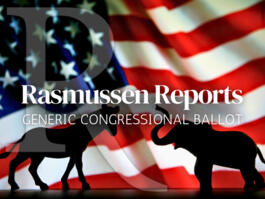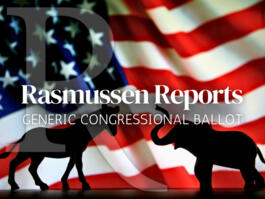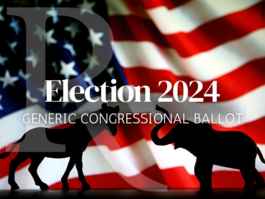MIDTERM MORSELS
A Commentary by Larry J. Sabato
Just having issued our Labor Day predictions, we’re not quite ready to call any of the remaining toss-ups or change any ratings (with one prominent exception), but we thought we’d share our current inclinations on a few of them in “nutshell” form.
Colorado Senate: After a visit last week, it’s more obvious than ever that the Republicans have completely blown their good opportunity to win the state governorship. Their tarnished nominee, Dan Maes, has been abandoned by just about everyone in the party after revelations about his past, and former Congressman Tom Tancredo (R) is splitting what remains of the GOP vote by running as an independent. As we have said for some time, Denver Mayor John Hickenlooper (D) is the unofficial Governor-elect. But what we picked up was interesting. Like many competitive Purple states, Colorado wants to send the Democrats a message. Since they cannot do it for Governor, they appear more likely to pay the postage in the Senate race, by supporting Republican nominee Ken Buck, a Tea Party candidate, against appointed Sen. Michael Bennet (D). Several sharp political observers in the Centennial State pointed this out to us. An odd psychology may be at work. It’s still a very close race, though.
Delaware Senate: Within minutes of insurgent Tea Party candidate Christine O’Donnell’s 53.1% to 46.9% victory on Tuesday night, we changed the rating of this November contest from Leans Republican to Likely Democratic. Had Congressman Mike Castle (R) defeated O’Donnell to become the GOP nominee, Castle would have been the fall favorite to add a Senate seat to the GOP column. Instead, previously little-known Democrat Chris Coons is likely to hold the seat of retiring appointed Sen. Ted Kaufman (D) for the Democrats. Both Sarah Palin and Sen. Jim DeMint (R-SC) endorsed O’Donnell, knowing full well that she would likely lose the seat in heavily Democratic Delaware. They made no friends among the state and D.C. GOP leadership, which rallied strongly on behalf of Castle and, after the votes were counted, immediately made it clear they would not be doing much to help O’Donnell. The leadership reasoned that they would get Castle’s Senate vote about 70% of the time, a good bit better than the 0% for Coons. Yet for very conservative Republicans, it is better to lose a seat than to accept any deviation from the ideological norm. And up is down, and war is peace, as anyone who has read George Orwell knows. This switch considerably lowers the likelihood of Republicans’ gaining control of the Senate, even though it is still theoretically possible if they run the table on the remaining competitive contests. As for the Crystal Ball, O’Donnell’s primary triumph lowers our projected national GOP gain from +8-9 to +7-8. In our September 2nd analysis, we promised to do exactly this if O’Donnell beat Castle.
Florida Governor: This could be the big win Democrats need to salvage something truly important from November 2nd. It’s too tentative to call, but so far Democratic nominee Alex Sink has maintained a small edge over Republican nominee Rick Scott. Sink is broadly acceptable and reasonably well known as Florida’s elected CFO. Scott is still struggling with the deep divisions left in the GOP after his primary victory over establishment-favored Bill McCollum, who has refused to endorse Scott. With an unlimited bank account and a Republican wave building, Scott may be able to pull this one out, but the Democrats are in a better position than they had dreamed a couple of months ago. This one will go to the wire. And to think it could have been boring, with Gov. Charlie Crist skating to a second term had he not gotten D.C. fever. You’d better believe Crist privately wishes he had run for reelection.
Florida Senate: Republican Marco Rubio has opened up a small lead in this crazy-quilt three-way race with Governor Charlie Crist (I) and Rep. Kendrick Meeks (D). Meeks will likely finish third in the end, so the real question is whether Democrats can find a way to collapse his vote in late October—once it is clear he is doing poorly—and transfer most of those votes to Crist so he can win. With no competitive African-American Democrat running elsewhere in the nation, national Democrats may be forced to stick with Meek, even though Crist would almost certainly sit with the Democratic caucus in the Senate. The Republicans don’t want Crist and they would face a rebellion among their base if they took him back. And yes, in the Senate, you have to pick a party or you may not get committee assignments or have any influence beyond floor votes. Independent Sen. Wayne Morse of Oregon found that out the hard way back in 1953, after he left the GOP but before he joined the Democrats. This Senate contest could be very late-breaking.
Georgia Governor: It surprises us to have this one listed a Toss Up. We are aware of a couple of public and private polls that show former Congressman Nathan Deal, the GOP nominee, leading former Democratic Gov. Roy Barnes outside the margin of error. Maybe it is just a matter of time before this contest becomes as Red as the Georgia clay and the overall election year, and that is the probable outcome. Yet Deal barely won the GOP nod and has ethics problems that keep cropping up in the news. Despite his stunning reelection defeat in 2002, Barnes is a wily politician. So at least for now, we decline to classify the race.
Hawaii Governor: In the last major primary of 2010 on September 18, Hawaii Democrats will choose either former Congressman Neil Abercrombie, who is leading the polls, or Honolulu Mayor Mufi Hannemann as their gubernatorial candidate. Along with everyone else, we’ve assumed the Democrat would win in November. But private polling is suggesting a more competitive race with Lt. Gov. Duke Aiona (R), the deputy of term-limited Gov. Linda Lingle (R). We’re watching this one, pending the post-primary dust-settling. It will still be hard for Democrats to lose, but tsunamis have been known to swamp this island state.
Michigan Governor: Something truly remarkable is happening in Michigan. The Republican nominee, businessman Rick Snyder, is romping to a landslide victory in this normally Democratic state. The Democratic nominee, Virg Bernero, is burdened by low funding and the unpopularity of term-limited Gov. Jennifer Granholm (D) and President Obama. Snyder’s likely victory is a linchpin of the broad group of Republican victories we are likely to see in normally Democratic states such as Iowa, Illinois, Ohio, Pennsylvania, and Wisconsin. If Snyder governs well, he could be a surprise pick for vice president in 2012 or a future presidential candidate.
Nevada Senate: Even from the East Coast, you can hear the gnashing of teeth in Nevada as voters try to decide between two less-than-perfect choices. Just as in Colorado, there is a desire to send a message to the governing Democrats, especially because Nevada’s unemployment rate is the highest in the nation (14.3%). What better way than by voting against President Obama’s prominent ally, Senate Majority Leader Harry Reid (D)? Reid has become deeply unpopular with consistently low poll ratings. But an easy Senate victory for the GOP evaporated when the Republicans nominated the highly controversial Tea Party candidate Sharron Angle, whose positions and statements include wanting to “phase out” Social Security, store nuclear waste at Yucca Mountain (not exactly a popular proposition in Nevada), and a potential resort to “Second Amendment remedies” if Congress continues on its present course. There is a "none-of-these-candidates" option, a unique Nevada ballot feature, which may enable the winner to secure less than a majority. To our surprise, though, polls have shown only about 3% choosing to thumb their noses at both candidates in this fashion, and a mere 1% are voting for a thrird-party or independent candidate. Voters seem to sense that the stakes are high, and it is possible they may determine which party controls the Senate. An entrepreneur might be able to make some good money by selling clothespins outside Nevada’s polling places in November.
New Hampshire Senate: The Granite State produced a nip-and-tuck contest between former state AG Kelly Ayotte and conservative activist Ovide LaMontagne. Ayotte had been the early favorite, but in the end she seems to have squeaked to victory by a slim 1,667 vote margin out of over 100,000 votes cast. The lines were blurred here, with Sarah Palin backing Ayotte and the Tea Party mainly coalescing about LaMontagne. A case could be made that the GOP was split asunder by a very tough four-way Senate free-for-all—but it appears the assertion has less foundation that one would think from the close outcome. The pendulum swing of 2010 is very evident in this Purple Northeastern state, and Republicans are reasonably well positioned to hold the Senate seat of retiring Sen. Judd Gregg (R) and pick up the House seat of the Democratic Senate nominee, Congressman Paul Hodes. The primary results haven’t changed our Senate rating of Leans R.
Ohio Governor: We’re not quite ready to tilt the contest yet, but everything we hear from highly reliable Buckeye State sources is that this gubernatorial contest is moving in Republican nominee John Kasich’s direction. The former congressman and Budget Committee chair is benefiting from a nosedive in President Obama’s ratings and the harsh economy in this Rust Belt state. Gov. Ted Strickland (D) still has some cards to play, and the last sitting governor of Ohio to be defeated for a second term was way back in 1974 (John J. Gilligan, a Democrat and father of former Kansas Governor and Obama Cabinet Secretary Kathleen Sebelius). But for Democrats, with the Senate race in Ohio also clearly trending Republican, it is time to press the panic button.
Texas Governor: We’ve long written about “Perry fatigue”, brought on by the record decade-long tenure of the sometimes controversial Gov. Rick Perry (R), who is running for yet another four-year term and perhaps the title of “Governor for Life”. Some party divisions linger from Perry’s bitter primary battle with Sen. Kay Bailey Hutchison, whom Perry sounded defeated. Democratic nominee Bill White, the mayor of Houston, is a credible candidate. Several recent polls have suggested a toss-up. We have a hard time believing that Perry will lose in deeply Red Texas in a strongly Republican year so we are keeping the contest “Leans R”. Still, it is worth watching.
Wisconsin Governor: On Tuesday the GOP picked longtime frontrunner Scott Walker to be its gubernatorial nominee, as he easily dispatched former Congressman Mark Neumann in the party primary. While Milwaukee Mayor Tom Barrett is personally popular, his candidacy suffers from association with two-term Gov. Jim Doyle (D), whose ratings are in the cellar. Barrett recently tossed the dice by airing a TV ad showing his gruesome wounds after he heroically saved a woman from a crazed attacker in August 2009. While voters salute what he did, it is probably not enough to enable him to overcome the GOP wave.
Larry J. Sabato is the director of the Center for Politics at the University of Virginia.
See Other Commentary by Larry Sabato
See Other Political Commentary
Rasmussen Reports is a media company specializing in the collection, publication and distribution of public opinion information.
We conduct public opinion polls on a variety of topics to inform our audience on events in the news and other topics of interest. To ensure editorial control and independence, we pay for the polls ourselves and generate revenue through the sale of subscriptions, sponsorships, and advertising. Nightly polling on politics, business and lifestyle topics provides the content to update the Rasmussen Reports web site many times each day. If it's in the news, it's in our polls. Additionally, the data drives a daily update newsletter and various media outlets across the country.
Some information, including the Rasmussen Reports daily Presidential Tracking Poll and commentaries are available for free to the general public. Subscriptions are available for $4.95 a month or 34.95 a year that provide subscribers with exclusive access to more than 20 stories per week on upcoming elections, consumer confidence, and issues that affect us all. For those who are really into the numbers, Platinum Members can review demographic crosstabs and a full history of our data.
To learn more about our methodology, click here.



